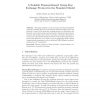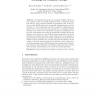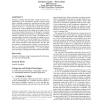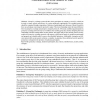126
click to vote
INFORMATICALT
2010
14 years 11 months ago
2010
Abstract. In 2008, based on the two-party Diffie
138
click to vote
CCS
2008
ACM
15 years 4 months ago
2008
ACM
When users run a group key exchange (GKE) protocol, they usually extract the key from some auxiliary (ephemeral) secret information generated during the execution. Strong corrupti...
142
click to vote
ASIACRYPT
2006
Springer
15 years 5 months ago
2006
Springer
This paper presents a secure constant-round password-based group key exchange protocol in the common reference string model. Our protocol is based on the group key exchange protoco...
124
click to vote
CRYPTO
2003
Springer
15 years 7 months ago
2003
Springer
We consider the fundamental problem of authenticated group key exchange among n parties within a larger and insecure public network. A number of solutions to this problem have bee...
129
click to vote
ASIACRYPT
2004
Springer
15 years 7 months ago
2004
Springer
Abstract. An authenticated group key exchange (AGKE) scheme allows a group of users in a public network to share a session key which may later be used to achieve desirable cryptogr...
124
click to vote
PODC
2004
ACM
15 years 7 months ago
2004
ACM
Group key exchange protocols allow a group of servers communicating over an asynchronous network of point-to-point links to establish a common key, such that an adversary which fu...
152
click to vote
FC
2007
Springer
15 years 8 months ago
2007
Springer
Task-specific groups are often formed in an ad-hoc manner within big structures, like companies. Take the following typical scenario: A high rank manager decides that a task force...
145
click to vote
ATC
2007
Springer
15 years 8 months ago
2007
Springer
Group key exchange protocols allow their participants to compute a secret key which can be used to ensure security and privacy for various multi-party applications. The resulting g...
125
click to vote
CCS
2009
ACM
16 years 2 months ago
2009
ACM
We treat the security of group key exchange (GKE) in the universal composability (UC) framework. Analyzing GKE protocols in the UC framework naturally addresses attacks by maliciou...




